- Home
- Pam Weaver
Pack Up Your Troubles Page 5
Pack Up Your Troubles Read online
Page 5
‘Isaac!’ Connie cried. There was about six years between them so Kezia’s baby brother was about fifteen or sixteen now. She remembered how when he was a year or so old, the two girls had taken it in turns to hoick him on their hip as they played together. He looked a lot like Kez. He had the same flaming red hair which was tousled and untidy but he was fresh-faced. He wore a kerchief at his neck and his shirt was open to reveal his hairless chest. Isaac’s greeting was polite but nowhere near as enthusiastic as his sister’s. As always, the men ate first.
As she sat by the campfire, Connie couldn’t help reflecting how different their lives were. Kez looked much older than her twenty-two years. Her hands were calloused from potato picking and Brussels sprout harvesting in the winter. At this time of year, her fingers were already stained bright red from picking strawberries and raspberries.
As is the custom with Romani gypsies, Kez had married young. The strict ethics of their culture demanded that all girls marry between sixteen and eighteen. She had to be a virgin and according to the code, she was only allowed a maximum of four suitors. Any more and she would be considered too flighty. Simeon, Kezia’s husband, had been her one and only suitor and she’d married him just before her seventeenth birthday.
As the baby finished feeding Kez looked up, giving Connie a shy smile. She sat her baby up to wind her and then handed her to Connie. ‘What did you call her?’
‘Blossom.’
‘I don’t recall a Blossom in the Bible!’
‘Well, that’s where you’re wrong, Connie Dixon,’ said Kez. ‘The day my daughter first drew breath Pen told Simeon, “It shall blossom abundantly, and rejoice even with joy and singing,” and that’s in the Bible that is.’
‘You’re kidding,’ Connie gasped.
‘Isaiah 35, Verse 2,’ said Kez adopting a superior tone.
Connie burst out laughing and Kez joined in. Looking down at this pretty green-eyed baby with wisps of bright red hair, her name suited her perfectly. She was small but sturdy. She would need to be. The life of a gypsy was hard. Kezia and her family were constantly on the move. They had always gone wherever there was picking to be done, setting up camp in some field belonging to the farmer in question. As each season came and went, they went on to the next place. It sounded idyllic, waking with the dawn and hitching the horse to the wagon to head towards the next source of work, but Connie didn’t envy them.
Sam had found a ball and he and Pip began a game of toss and fetch. The gypsy dogs, tied to the fence post, could only look on enviously and the pair of them giggled and barked together. Connie sighed. If only life were always this simple, this pleasurable.
Connie had been around Kez and her family enough times to know that contrary to a commonly held belief, the true gypsy was not dirty. She watched as Kez scrubbed her little boy before getting him ready for bed. She worked so hard on him the child began to protest. After changing her baby’s nappy, one of the other women took them both inside the long trailer to put them to bed, giving the two friends time together to catch up with their news.
As soon as he had eaten, Reuben was ready to sleep. He never slept inside the caravan because that was purely to house his possessions. Instead, he crawled inside a small tunnel tent pitched on the grass verge beside it and said his goodnight. As he laced the front of the tent, Connie listened to him coughing.
‘He’s not so good,’ said Kez quietly, as if reading her thoughts. Connie nodded. What could she say? Life on the road was hard on them all. Sleeping out in the open when you’re unwell wasn’t ideal but it was no good suggesting that he should go indoors. The open air and the freedom of the road was all Reuben knew.
‘Has he seen a doctor?’ Connie asked.
‘He won’t go to a doctor,’ said Kez with a shrug. ‘He says all doctors are Gorgias and not to be trusted.’
‘Doesn’t it get any easier?’ Connie asked. ‘Being on the road, I mean?’
Kezia shook her head. ‘Sometimes, even before we unhitch the horse, the village bobby comes along on his bicycle to tell us to move on.’
‘Couldn’t you refuse?’
‘If we do they threaten to take our children away and put them in a home.’
Connie was appalled. ‘Can they do that?’
Kez shrugged. ‘So they say.’
Connie shivered. The sweater only had short sleeves and she was getting cold now. She wished she’d brought a cardigan. ‘I’d better be getting back,’ she said.
‘You didn’t get your tea yet,’ said Kez.
Connie sat back on the caravan steps and sipped the scalding hot tea. Kez must have noticed her shivering because she threw a shawl over her shoulders. As Kezia ate, Connie told her about life in the munitions factory and the WAAF. Kez told Connie about the day her mother died and the loss of her little Joseph. On a happier note, she told Connie about meeting Simeon and of their marriage. Simeon, who had joined up during the war, had only just returned to her. He had adjusted to life with the Gorgia and, she said proudly, ‘He did his bit.’
‘Simeon talks of buying land,’ Kez went on. ‘He wants us to settle down.’
Connie was sceptical. ‘But you’ve always enjoyed moving around. Will you be able to settle in one place?’
‘Simeon managed in the army right enough,’ she smiled. ‘The kids and I will get used to it. I want Sam to go to school. I want him to read and write.’
Connie nodded and the two friends looked at each other with the same unspoken thought in her head. Reuben coughed again.
‘I want a better life,’ said Kez quietly. ‘The Frenchie says Simeon has a real talent.’
Connie was puzzled. ‘The Frenchie?’
‘I don’t know his name,’ Kez shrugged, ‘but he says if I learn to read proper, we could go into business and I can help Simeon.’ She sighed. ‘We never stayed long enough in one place for me to learn at school.’
‘If you’re going to stick around here for a while,’ said Connie, ‘I could try and teach you to read if you like?’
‘Would you?’ cried Kez.
They hadn’t noticed Isaac coming up behind them. ‘What’s the point?’ he glared. ‘Waste of time, a girl learning to read.’
‘I want to read books,’ said Kez defiantly. ‘There’s some good things in books.’
‘Pah!’ said Isaac. He had some fishing gear in his hand. ‘You can’t eat books.’
They watched him walk away and Connie smiled. ‘You stick to your guns, girl.’
‘I intend to.’
‘You said the Frenchie says Simeon has a talent but what does he do for a living?’
Kez shrugged. ‘Odd jobs, scrap metal, driving, that’s all that’s on offer for the likes of us.’
‘So what is his talent?’
Kez led the way round the hedge to where the motor trailer stood. Connie gasped as she saw the beautiful wooden carvings he had put on the side. It wasn’t to Connie’s taste, too garish for that, but she could see that he had a real eye for it. Fleurs-de-lys, scrolls and arches were everywhere and Simeon was up a ladder decorating them with gold leaf.
‘This is amazing!’ Connie cried.
‘And he done the whole thing from scratch.’ Kez smiled in a satisfied way as she touched her husband’s leg and they exchanged a loving glance.
‘What about you, Connie?’ asked Kez. ‘What do you do now?’
‘Didn’t I tell you, I’m going to be a nurse?’ said Connie.
‘A nurse,’ cried Kezia. ‘Don’t you want to get married?’
Connie thought fleetingly of Emmett. ‘Maybe. When the right man comes along.’
Kez grinned. ‘Good for you.’
They went back to the fire and sat down to reminisce. It was getting dark by the time Connie made a move to go home. ‘Are you sure you’re going to be all right walking back on your own?’ Simeon asked as he cleaned his brushes.
‘Fine,’ said Connie. ‘I have Pip with me. He won’t let anybody touch me.’
‘Don’t forget to put the clocks back an hour,’ Kez reminded her. ‘Double summer time ends tonight.’
‘So it does,’ Connie smiled.
As she said her goodbyes and left, Connie felt loved and accepted by all of them. Everyone except Isaac. He had been less pleasant. In fact, he seemed to have a giant chip on his shoulder.
The house was in darkness when Connie got back home. She gave Pip a drink of water and the few scraps her mother had saved him from the evening meal.
‘Silly old dog,’ she said softly as she fondled his ear. ‘I didn’t abandon you, you know. I still love you.’
Leaving him in his basket, Connie crept upstairs. She had thought everyone was asleep but then she heard Ga call her from her room. Connie only ever went in there when invited. It was a cluttered place with piles of leaflets and papers all over the dressing table and the chair. As soon as she walked in the door, Connie could tell by the expression on Ga’s face that something was wrong. She was sitting up in bed, her handbag beside her and her bad knee resting on a pillow. She had a lacy bed-shawl around her shoulders and her hair was in steel pins. How on earth did she sleep in those? Connie wondered.
Olive motioned for her to sit on the bedside chair so Connie moved the mound of papers onto the floor.
‘I want to talk to you about this nursing business,’ said Ga. Connie opened her mouth straight away but her great aunt put up her hand to silence her. ‘You might not be worried about how this will affect me …’
‘And you don’t seem to be bothered that I have a right to my own life,’ Connie interjected.
‘But,’ Ga continued loudly and clearly not listening, ‘have you thought of what this will do to your mother?’
Connie faltered. ‘Mother? In what way?’
‘Can’t you see how she looks?’ said Ga accusingly. ‘The poor woman is exhausted.’ She paused as if to let the words sink in. ‘We need you, Constance. We need you to help share the workload. Gwen cannot carry on much longer.’
There was a short silence. ‘But Clifford will be coming home shortly,’ said Connie.
‘And what sort of a state do you think he might be in?’ Ga retorted. ‘Besides, he’s not getting any younger either. I already told you, we need a young pair of hands.’
Connie looked away. She felt sick with disappointment. She didn’t want to admit it but Ga was right about one thing. Her mother did look worn out. And thin. Connie chewed her bottom lip helplessly. Did she really have to give up the idea of nursing? Surely there had to be another way? It was so bloody unfair. She had a right to live her own life but if she walked out on her mother now, she would just be plain selfish.
‘You don’t have to give me your answer now,’ said Ga. ‘Just think about it.’
‘All right,’ she said quietly, loathing the look of triumph in Ga’s eyes.
Ga nodded. ‘Good girl.’
Biting back her tears, Connie stood up. ‘If I do stay,’ she said stiffly, ‘it will only be for a while. I intend to be a nurse, no matter what you say.’
Ga’s mouth set in a tight line.
‘Oh, one more thing,’ said Ga, as Connie turned to leave. She opened her cavernous handbag, and pulled out a newspaper cutting. Connie took in her breath. It was the picture from the Daily Sketch, the one of her and Eva standing in the fountain at Trafalgar Square with the two sailors. The caption above it read, Playtime for English Roses. She remembered how she’d rolled up her slacks and stood in the water before the two sailors climbed in beside them. The picture was quite flattering too. Connie grinned.
‘It’s no laughing matter,’ Ga snapped. ‘I am absolutely disgusted.’
‘Why?’ Connie challenged. ‘It was only a bit of innocent fun. You were young yourself once, Ga.’
Olive’s face clouded.
‘Come on, it was VE Day,’ Connie protested mildly. ‘We were all happy. The war was over.’
‘And so you took it upon yourself to climb into a fountain with Eva Maxwell.’
For a minute Connie was thrown. She had thought she was going to get a lecture about flaunting herself with two strange men. She hadn’t forgotten the rage she’d felt herself when she’d realised who Eva was, but it didn’t seem that important now. ‘At the time, I didn’t know who she was,’ Connie said with a shake of her head. ‘She was a friend of a friend and she said her name was O’Hara.’
‘Typical,’ Olive sneered. ‘They’re all liars, that lot.’
For some reason, Connie felt the need to defend Eva. ‘O’Hara is her married name,’ she said haughtily. ‘And just for your information, I met her family. It was all very sad. Her husband was killed in the war and I didn’t know who she was until much later in the day.’
Their eyes locked together in a common challenge. Connie refused to look away but it was clear that Olive wasn’t beaten yet. ‘Perhaps that is why Emmett disappeared,’ she said cuttingly. ‘I wonder what he thought when he saw a picture of his fiancée cavorting about with other men? I should have thought you would have learned your lesson by now, my girl.’
Connie’s heart began thumping in her chest. ‘For a start, Emmett was never my fiancé,’ she snapped angrily. ‘And secondly, I have never cavorted with other men, Ga, no matter what you think.’
‘I have a long memory,’ said Ga pointedly.
Connie froze. ‘You always have to bring that up again, don’t you,’ she snapped. ‘I was only a child. It wasn’t my fault.’
Ga looked down her nose. ‘Huh. Seems to me you haven’t changed much,’ she said, waving the newspaper cutting in the air. ‘Most men can sniff out a loose woman a mile off and you’ve got Gertrude’s blood in you, that’s for sure.’
Gertrude Dixon had scandalised the family first by getting herself tattooed and then by running away with a man from the fairground. It might have only raised a few eyebrows now, but fifty years ago, it was so shocking the family had never spoken of her again. Only Ga was determined to keep her memory alive.
Connie felt her face grow hot. ‘The whole of Trafalgar Square was packed with people,’ she said from between her teeth, ‘and they simply climbed in with us.’
‘You’ve got your arms around them,’ said Olive looking at the cutting again. ‘Not to mention the fact that both of you were half undressed …’
‘We were not! We rolled our slacks up so that they wouldn’t get wet.’ Connie’s face was flaming with anger. ‘Anyway, you never read the Sketch. How did you get this?’
‘You’re right. I never look at such trashy papers,’ said Olive with a deep breath. ‘And I certainly don’t expect members of my family to be on the front page but you see, someone sent it to me.’
She pulled an empty envelope from her bag. Connie could see it was addressed to Ga and in the left-hand corner someone had printed in bold letters the words, CONSTANCE AND EVA MAXWELL.
That added insult to injury. Connie was furious but with one quick move, she snatched the cutting from her hand. It tore as she did so but she still had most of the picture. Screwing it into a tight ball, she swept angrily from the room.
Olive lay on her bed staring at the ceiling. She couldn’t sleep. She glanced at the clock beside her bed. One thirty. It wasn’t her leg that kept her awake, it was Constance. How dare she cavort in that fountain with Cissy Maxwell’s granddaughter? Everybody knew how she felt about that family. Constance should have known better.
Olive turned out the light and her mind drifted back some forty years ago, to a time when she herself was twenty, and the century was only five years old. Arthur was coming home. It had been a bleak time. The Boer War hadn’t been as terrible as the Great War nor as bad as the one they’d just gone through, but war is war. The enemy may be different and the weapons more sophisticated, but being wounded far from home and facing the prospect of dying in a foreign field was just as terrible whatever the age. Damn these ambitious men and their thirst for power, she thought. Most people simply wanted to live their lives in peace and safety. Why co
uldn’t they do the same?
She remembered how it was when the troops came back, all that marching in the streets, the parades, the flag waving and the cheers. She smiled when she thought of Arthur. Dear Arthur. How handsome he looked, so tall, so suave with his new moustache and smart uniform. It hadn’t been easy for him. She could tell that the moment she’d looked into his eyes. There was a weariness there that belied his twenty and six years. He never talked about what he’d seen but Pa had read about the war and what was going on in the papers at the breakfast table. He must have had a terrible time.
Life for Olive and her family had gone on as usual while they were away. They had been well off. Pa’s greenhouses were renowned for their beautiful grapes and cucumbers. There had been no need for her to work back then so she had grown up taking long walks on the downs where the musky scent of wild flowers, pink and blue and yellow mingled with the dainty call of skylarks and the curlew. She still recalled the spicy scent of honeysuckle and gorse and the more rancid odour of the sheep allowed to roam free. Back then, the silence of the countryside was only broken by the sound of bleating sheep or the occasional dog barking and on Sundays, the peal of church bells. How times had changed. When was the last time she had heard the sound of the coachman’s horn as he entered the village bringing much needed goods from Worthing three times a week and in all weathers? Not since the 1930s. Now it was all army lorries thundering along the lanes and coupons and going without.
Arthur had been part of the final stages of the Boer War, a time of ignoble victory. Frustrated by the constant skirmishes and guerrilla tactics, the British had adopted a scorched earth policy, destroying farms, homesteads and poisoning wells to prevent the Boers re-mustering. Any women and children left behind on their farms by their menfolk were rounded up and put into camps and because the supplies were hard to come by, tens of thousands of them died of malnutrition and disease. Much to his disgust, Arthur and his unit were left to guard them. How he’d hated it. He had even written to say that he would have much preferred to fight the enemy rather than take it out on women and children. Peace came with the Treaty of Vereeniging. The irony was, just as he was about to embark for home, Arthur was terribly injured.

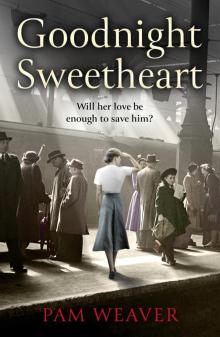 Goodnight Sweetheart
Goodnight Sweetheart At Home by the Sea
At Home by the Sea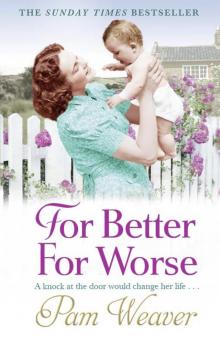 For Better For Worse
For Better For Worse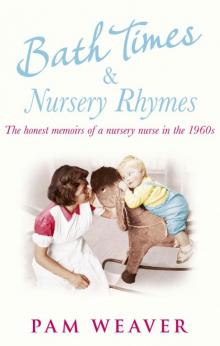 Bath Times and Nursery Rhymes
Bath Times and Nursery Rhymes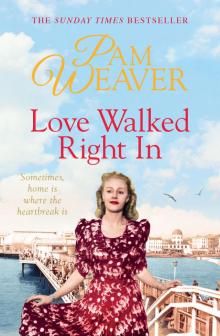 Love Walked Right In
Love Walked Right In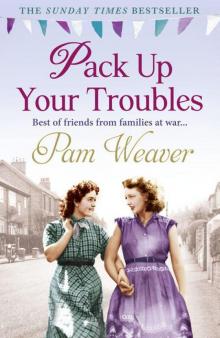 Pack Up Your Troubles
Pack Up Your Troubles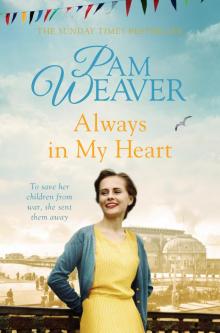 Always in my Heart
Always in my Heart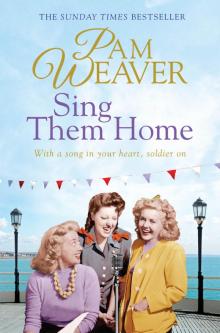 Sing Them Home
Sing Them Home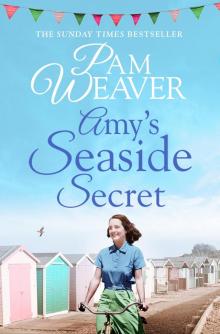 Amy's Seaside Secret
Amy's Seaside Secret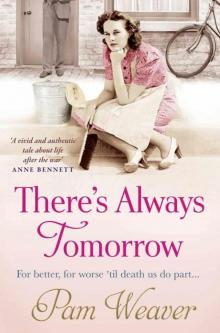 There’s Always Tomorrow
There’s Always Tomorrow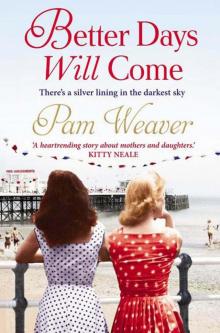 Better Days Will Come
Better Days Will Come Family Drama 4 E-Book Bundle
Family Drama 4 E-Book Bundle